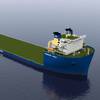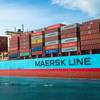Port of Rotterdam Strict on 'Polluter Pays' Principle
The Port of Rotterdam has emphasized the reinforcement of the polluter pays principle in the run-up to trilogue negotiations on the Port Reception Facilities Directive.
Last month, on October the 9th, the Transport Committee of the European Parliament adopted the Meissner report on the Port Reception Facilities and gave a mandate to the Rapporteur to start negotiations with the Council to finalize the text of the new law.
In the run-up to these negotiations, the Port of Rotterdam supports the view that minimization of waste discharges in the sea benefits from an effective and efficient legislative framework with incentive structures that promote the delivery of ship-generated waste.
In that context, the Port of Rotterdam Authority currently offers the best possible efficient waste reception facilities for a wide range of types of waste, including hazardous waste. However, the Port of Rotterdam Authority also considers it important that the polluter pays principle is embedded in the new law.
Both environmentally aware vessels and ports with well-functioning waste facilities should not have to pay for the additional costs as a result of limitless and unreasonable amounts of waste delivery.
Therefore the Port of Rotterdam welcomes in particular the European Parliament proposal to strengthen the ‘polluter pays principle’ by discouraging the delivery of unreasonable quantities of garbage, including hazardous waste, for a fixed fee.
By doing this the text develops a balance between incentivizing ships to deliver waste generated on board in the ports while at the same time it also encourages ships to limit the waste at the source, by preventing ships to deliver unreasonable amounts of waste without paying for it. Additionally the Port of Rotterdam also welcomes the exemption of vessels engaged in port related services.
However, the Port of Rotterdam regrets that the Parliament decided to make rebates mandatory for green management of waste on board of ships. While encouraging ships to work on sustainable waste management, The Port of Rotterdam believes the decision to give rebates must be taken at port level.
Rebates are generally applied to address the local environmental challenges. In some areas, waste pollution is a great environmental concern while in others it is air quality and emissions. Furthermore, mandatory rebates disregard the existence of different business and governance models in ports across Europe.











